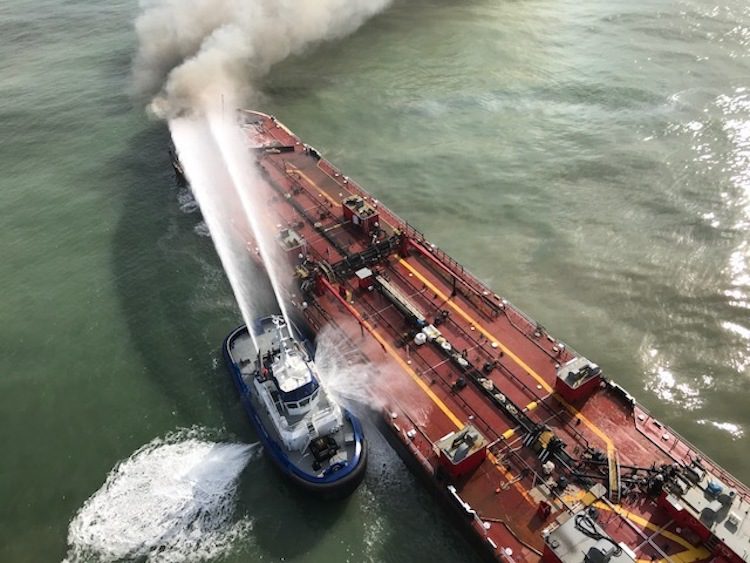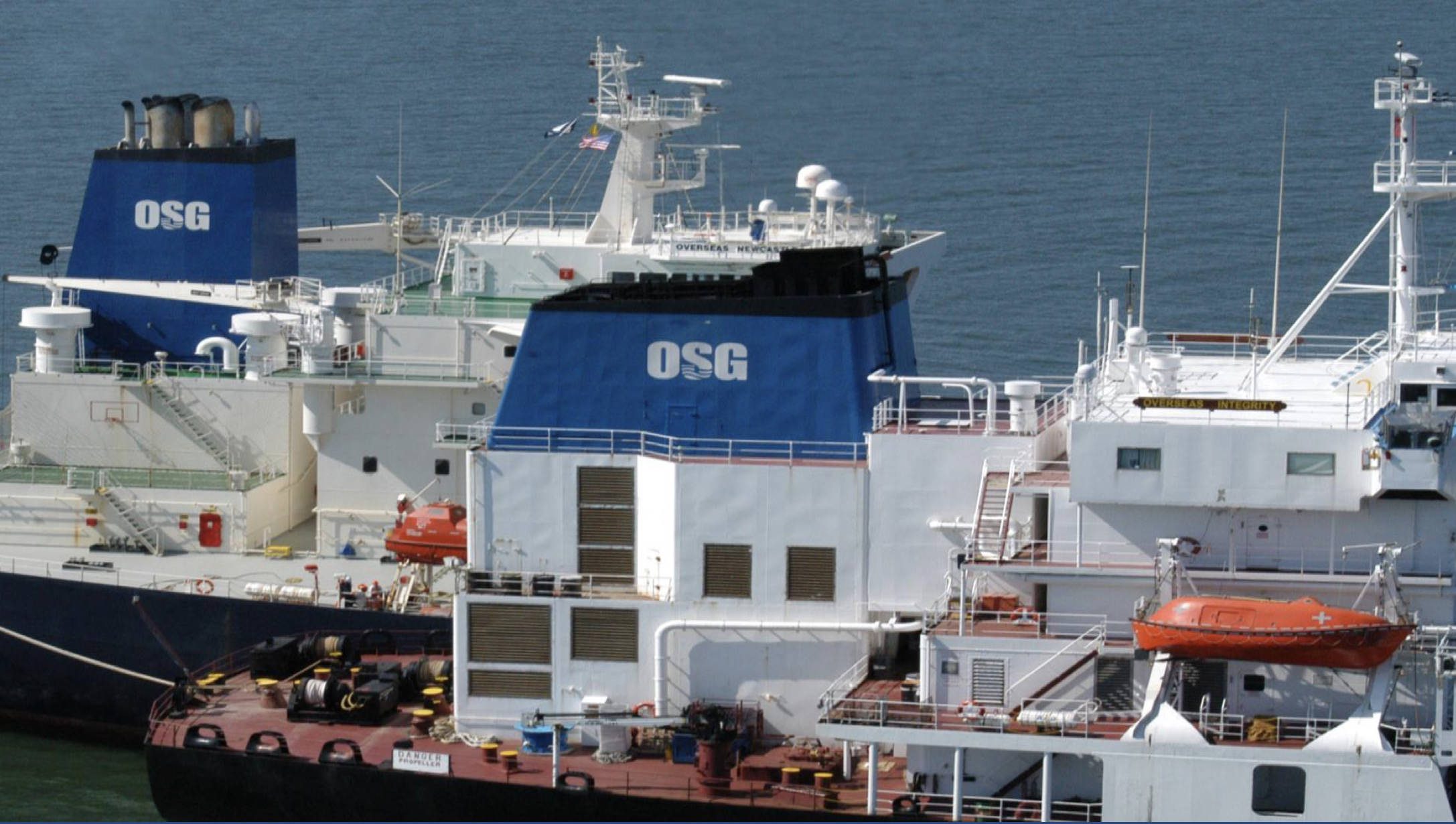A Corpus Christi Fire Department vessel extinguishes a fire onboard a barge approximately three miles from the Port Aransas, Texas, jetties Oct. 20, 2017. A Coast Guard Corpus Christi MH-65 Dolphin and HC-144 Ocean Sentry are searching for two missing crewmembers. U.S. Coast Guard photo.
Editor’s Note: This article is part of a series focussing on the U.S. Coast Guard’s public hearing on the explosion and fire aboard the Bouchard No. 255 tank barge that claimed the lives of two people off the coast of Port Aransas, Texas on October 20, 2017.
Highlights:
- Ship captains walking off the job
- Crew hiding safety problems from Coast Guard inspectors
- Testimony piles up in maritime casualty investigation
By Barbara Liston (Clearview Post) – Two barge captains for Bouchard Transportation in 2017 walked off the job over concerns about the condition of their oil tanker within days of the explosion of another Bouchard tanker off the coast of Texas, killing two seamen, a witness testified during the U.S. Coast Guard casualty investigation.
Keith Hardwick, a third mate on Bouchard Barge No. B245, said the first captain, Eric Hinman, walked off after Bouchard management ordered the vessel to shove off from a shipyard in Tampa and head for Houston before barge repairs underway at the shipyard were completed.
As he departed, Hinman forwarded to the crew copies of emails in which he reported a list of seven unresolved problems with the barge to management, and management’s response.
“While we were still in the shipyard just before our barge sailed, our captain Eric Hinman told the company he would not sail that barge and walked off the vessel. And just before he walked off the vessel, he gave us these emails and told us to keep them just in case something happens so there is proof that he brought up these issues with the barge,” Hardwick testified.
“And why did he give them to you?” Coast Guard chief warrant officer Lanette Jeanes asked Hardwick.
“As a protection to us so no one could say they didn’t know about the problems that he was bringing up.”
The second captain, Greg Spencer, was persuaded by Bouchard to remain with the barge until it arrived in Houston, Hardwick said.
“Mr. Spencer told me directly it was not ready for transit and he had threatened to quit and get off the barge before it sailed and that they had begged for him to stay and told him they would replace him with another captain when we got to our destination. They told him he would not have to load the barge. They asked him to please remain on the barge as captain for its voyage,” Hardwick said.
“And he told you that directly?” asked Bruce Davies, chief of Coast Guard investigations for the Houston-Galveston sector.
“Yes, he did.”
Hardwick testified July 24, the seventh day of a two-week public Coast Guard hearing in Houston into the cause of an explosion on a sister barge that killed Zachariah Jackson, 28, of Salt Lake City, and Du’jour Vanterpool, 26, of Houston.
The two seamen were blown off the deck of the 448-foot-long, 38-year-old Bouchard Barge No. 255 which was loaded with 140,000 barrels of crude oil enroute to a refinery in Corpus Christi.
Jackson’s body has never been found. His parents are suing Bouchard Transportation of Melville, New York, owner of the barge and its tugboat, for more than $1 million.
The family alleges the vessels were “improperly maintained, dangerous, unseaworthy, and otherwise unfit for the purpose they were being used,” according to the complaint filed by Kurt Arnold of Arnold & Itkin in Houston.
Hardwick, a longtime personal friend of Jackson’s, was hired by Bouchard a month before the explosion, and he resigned a few weeks after.
As Hardwick’s testimony was getting underway, a Bouchard representative objected to his testimony as irrelevant because it involved the B245, not the B255.
“The Coast Guard repeatedly calls witnesses that have nothing to do with the explosion and we object on the basis of competency, relevance and being unnecessarily cumulative,” the Bouchard representative argued.
“His testimony is relevant,” Davies said. “The objection is overruled.”
After being hired in September 2017, Hardwick said he was sent to the Gulf Marine Repair shipyard in Tampa to help expedite work on the B245. He said the work appeared to be extensive. He saw holes cut into the hull of the barge to facilitate major internal structural steel work in the tank and coating being applied to the ballast tanks.
“When the ship left the shipyard, was everything ready to leave? Were you ready to leave the shipyard?” Davies asked.
“It was not,” Hardwick said.
“What was not ready?”
“One of my main concerns was the hydro testing on the barge had been started but had not been completed. Approximately an hour before we sailed from the shipyard, I witnessed them replacing flex couplings on the main deck in the cargo piping. There was no hydro testing so we wouldn’t know if they were going to leak or not when we started operations,” Hardwick said, adding that 80 percent of the below deck cargo valves also were inoperable.
“Do you know why you left the shipyard so quickly?” Davies asked.
“I was being told by the shipyard workers that the owner – they didn’t state the owner’s name, just the owner – wanted the barge gone now. The shipyard workers weren’t very happy about it. They weren’t done with their work. They were being rushed off the barge.”
Hardwick said one of the shipyard workers handed him a roll of gasket material and adhesive as they departed.
After the barge arrived in Houston, it was boarded by Coast Guard inspectors who wanted to test the vessel’s inert gas system (IGS). The IGS works to reduce the combustibility of vapors that are present even after the oil cargo has been unloaded.
Hardwick said the crew knew there was a problem with the barge’s IGS. The alarm indicating overheating in the combustion chamber had been going off after five minutes of operation. To hide the problem from the Coast Guard, Hardwick said he ran the IGS for about two minutes, then intentionally triggered the alarm himself to demonstrate to the Coast Guard that the alarm worked.
“Who recommended you deceive the Coast Guard like that?” Jeanes asked.
“This was a consultant on board…He told me he was hired by Mr. Bouchard,” Hardwick said.
Hardwick said he talked to Jackson before the fatal voyage. In the course of the conversation, Jackson told him that he was having trouble with the B255’s crane hydraulics. One was inoperable and the other was making strange noises, Hardwick said. In the crane that worked, Jackson told him, the wires were showing wear and tear.
Testimony has indicated that blue flames suddenly encircled Jackson and Vanterpool on the B255 deck just as the anchor was being lifted for the barge to travel from Port Aramus to Corpus Christi. In the explosions that followed, the two men were blown into the Gulf of Mexico.
Editor’s Note: This article is part of a series focussing on the U.S. Coast Guard’s public hearing on the explosion and fire aboard the Bouchard No. 255 tank barge that claimed the lives of two people off the coast of Port Aransas, Texas on October 20, 2017. The full series of articles on the hearing can be found here or at the links below:
Links to more articles in the series:
Part 1: ‘I Was Hearing Blasts Every Second
Part 2: ‘He Slipped Out of His Life Jacket and Sank to the Bottom’
Part 3: Conflicting Testimony and Disputed Phone Calls
Part 4: Former Bouchard VP ‘Shocked’ at Condition of Barge 255
(You are here) Part 5: ‘No one could say they didn’t know about the problems’
Part 6: Final Day – ‘Sitting On a Big Powder Keg’
Unlock Exclusive Insights Today!
Join the gCaptain Club for curated content, insider opinions, and vibrant community discussions.

 Join The Club
Join The Club







![A screengrab of a map showing an earthquake Mindanao, Philippines on Dec 2, 2023. (Image: US Geological Survey [USGS])](https://gcaptain.com/wp-content/uploads/2023/12/Screenshot-2023-12-02-at-10.45.17-AM-copy.png.webp)





